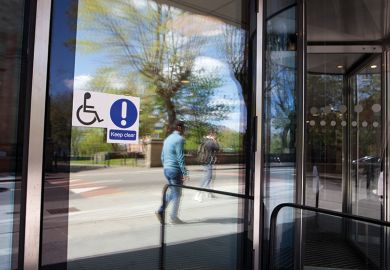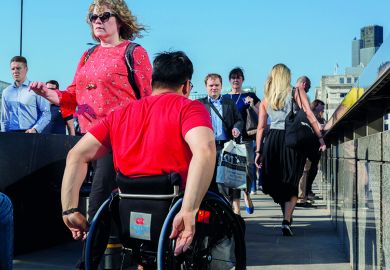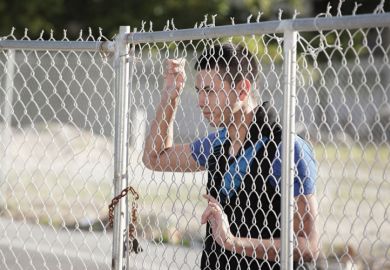As someone who works in dyslexia and disability support, I was unsurprised by the Office for Students’ recent report highlighting English universities’ failure to foster fully inclusive and accessible learning environments.
The regulator’s October Review of Support for Disabled Students in Higher Education in England revealed not only that disabled students are more likely to drop out of university than their non-disabled counterparts but also that universities rely too heavily on students' disclosing their disabilities and requesting support.
I know first-hand how difficult it is for disabled students to access the right sort of specialist assistance. Doing so requires an understanding of multiple agencies that would tax the most enthusiastic bureaucrat. Take students with dyslexia, broadly considered the least “complex” disability. If they already know they have dyslexia, they have the option to indicate it on their Ucas application form, whereupon consciousness staff from university disability services (or equivalent) will contact them – usually after offers have been made.
So far so straightforward. However, many universities at this point require the student to substantiate their claim to require support and adjustments via a full educational psychological assessment report that includes a clear diagnosis of dyslexia or specific learning difficulties. Many students are unable to provide such evidence. Often, they were screened at school to standards of assessment that were not diagnostic, or they were fully assessed years ago but no longer have the report.
Hence, depending on the university’s policy, it is likely that access to specialist services will be postponed until one certified professional produces the right sort of document for a second professional to assess. For students with dyslexia – a learning difference that includes information-processing difficulties and poor short-term memory – this process can be complicated and burdensome, particularly if an updated psychological assessment report needs to be arranged and paid for.
Once that has happened, all should in principle go smoothly, with appropriate adjustments put in place. But that is true only if the student does not apply for Disabled Students’ Allowance to fund any additional specialist support. If they do, an application to their funding body is also necessary. And, of course, the bureaucracy doesn’t end there. Once the allowance has been awarded, the student is asked to attend an assessment of study needs with an independent assessor – who, in turn, will recommend that funding be made available for external companies to provide services such as specialist study skills sessions and training for any assistive technology that is deemed necessary. Accessing the appropriate level of support, therefore, can require the student to juggle more than half a dozen different organisations.
Universities with the right sort of commitment to the social model of disability should do what they can to mitigate this sort of bureaucratic nightmare, such as by being more flexible over what evidence they will accept, offering greater student choice over assessment methods and investing in their own assistive technology and in-house academic study skills support for all students.
Chris Millward, director for fair access and participation at the OfS, has urged institutions to “identify and address any weaknesses in the support they are offering to all disabled students”. But students who have chronic medical conditions will require different support from visually impaired students, who, in turn, have a different set of needs from hearing-impaired students – not to mention students with physical impairments. Hence, even the most affluent and progressive university would be hard pressed to put measures in place for all disabled students.
This brings us back to the administrative labyrinth of the Disabled Students’ Allowance, which, in reality, funds much specialist support – such as sign language interpreters, sighted guides, care workers, specialist note takers, mobility trainers and physiotherapists – via organisations external to the university: a combination of private businesses and charities operating to a cost-benefit model of service. The late disability activist and University of Kent professor Mike Oliver, who pioneered the social model of disability, recently commented that such charities have always “sucked up to the government and failed to meet the needs of disabled people”. It would be hard to contest this view in light of the OfS report’s highlighting disabled students’ high dropout rates and poor academic performance.
The fundamental problem is that disabled students are not automatically given the right to receive support. The 2010 Equality Act requires institutions to put in place “reasonable adjustments” to help overcome any disability-related barriers, but what “reasonable” means is open to interpretation – and implies that some adjustments must be “unreasonable”.
Allowing higher education providers this amount of wiggle room in the support they may or may not give students shifts the focus of institutional attention away from what disabled students need and on to the university’s capacity to provide it. This may, to an extent, be unavoidable given the prohibitive cost for universities of funding all students’ needs under the present system. But it is depressing to reflect that while that system persists, we will mostly be talking about support rather than inclusion.
It is hard to avoid the conclusion that British campuses will never be truly accessible.
Stephen Campbell is dyslexia and disability coordinator at Leeds Trinity University.
POSTSCRIPT:
Print headline: An impossible dream
Register to continue
Why register?
- Registration is free and only takes a moment
- Once registered, you can read 3 articles a month
- Sign up for our newsletter
Subscribe
Or subscribe for unlimited access to:
- Unlimited access to news, views, insights & reviews
- Digital editions
- Digital access to THE’s university and college rankings analysis
Already registered or a current subscriber?








